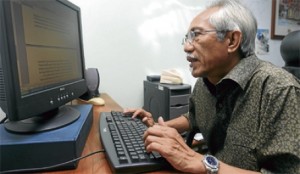Kadir Jasin doesn’t just fade away, he writes on
By Johan Jaaffar
WHEN I was in limboland after 1998, Datuk A. Kadir Jasin was among the few who helped me navigate through some tough times. Ironically, among my contemporaries, he was the one I found most difficult to “click” initially. Perhaps our official trip to Taiwan together in 1994 changed all that. I discovered Kadir, the man, the journalist and a true friend.
I was honoured to write the introduction to his latest book, KuntaKinte Original: CatatanKopitiam A. Kadir Jasin, the compilation of his articles in BeritaHarian from August 2009. KuntaKinte is the nom de plume he used for his pojok, which literally means space. Pojok writing has been a mainstay of Malay journalism since it was popularised by the first editor of Utusan Melayu, A. Rahim Kajai back in 1939. Perhaps “parody” is closest to the Malay concept of pojok. In the hands of Rahim and later A. Samad Ismail and Ishak Haji Muhammad, pojok became a powerful tool to criticise, condemn and question anything and anybody that moves, tastefully of course and with finesse.
Kadir got away with murder in his KuntaKinte column, a peculiar name to pick for someone writing about his bangsa and negara. The name was made famous by Alex Haley in Roots: The Saga of an American Family, which later became one of the most successful TV series in US history. Kadir’sKuntaKinte is bold and uncompromising, questioning how his race despite being labelled lords of the land remained poor and backward and his country despite being portrayed as the land of plenty offers only the few and the privileged plentiful opportunities.
Kadir has always been the man with a mission, that translates into being difficult and beyond control. He has a mind of his own. He pursues his own agenda much to the distaste of the political masters. But more importantly, he is first and last a journalist. So despite his foray into the corporate world, he behaved and operated as a journalist. He was one of the empat budak Melayu (four Malay boys) who took over NSTP back in 1993. He was however a marginal player in a bigger scheme of things. He was an owner in name only, the real show was run by one of his colleagues, whose powerful connection at the highest level guaranteed fast passage and unprecedented business deals.
The “marriage” as expected didn’t last. The business empire disintegrated after the economic crisis and the political turmoil of 1998. Kadir stayed a while longer as group editor-in-chief of the NST, but later was unceremoniously told to leave after another regime change at the NSTP. Kadir kept writing, re-energising his hugely popular “Other Thots” column in the NST for Malaysian Business. BeritaHarian resurrected his KuntaKinte in 2009.
Kadir had always wanted to be a journalist. He joined Bernama 43 years ago. Most of the time he was with the NSTP, under the watchful eyes of among others, Samad and Lee Siew Yee. Things were different back then so too the world of newspapering. The tools for journalists were Royal, Underwood or Olivetti typewriters, lots of courage and few survival kits. Kadir had worked with the best and finest in the world of journalism. If he can survive the feared Samad as his sifu, he can survive anywhere, which he did.
He had a special reason to leave his village in 1969. He wanted to prove something to a girl he was eyeing for some time, one Siti Sarah, daughter of an assistant village head, who was a stunning beauty. Mind you, they never once spoke to each other, but regardless Kadir rode a bicycle just to seek a glimpse of her before he left. Wherever she is today, Siti Sarah inspired Kadir to try his luck in Kuala Lumpur.
What a career it was. And the climax was when he received the MPI-Petronas Eminent Journalist Award (Tokoh Wartawan Negara) on Monday, the ninth recipient of the most coveted award in journalism. He is now in the hall of fame together with his mentors, Samad and Siew Yee. He is the last of the Mohicans, for his contemporaries have either moved on with their lives or been elevated to higher positions.
Kadir was one of the first journalists to embrace the social media. He was blogging even before it became mainstream. In fact so powerful was “The Scribe” in the cybersphere that his no-holds-barred pieces rattled the previous prime minister and his administration. Kadir was one of the proponents of political blogosphere.
Some argue, good soldiers don’t die, they just fade away while good journalists are simply forgotten, but Kadir simply refuses to fade away or be forgotten. He writes on.

